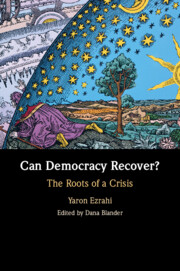Refine search
Actions for selected content:
3 results
14 - The Loss of Self-Evident Public Facts and the Crisis of the Commonsense Conceptions of Reality
- from Part IV - The Erosion of the Epistemological Constitution of Modern Democracy
-
- Book:
- Can Democracy Recover?
- Published online:
- 02 January 2025
- Print publication:
- 16 January 2025, pp 139-149
-
- Chapter
- Export citation

Can Democracy Recover?
- The Roots of a Crisis
-
- Published online:
- 02 January 2025
- Print publication:
- 16 January 2025
2 - Darwinian Evil and Anti-Theistic Arguments
-
- Book:
- Animal Suffering and the Darwinian Problem of Evil
- Published online:
- 17 March 2020
- Print publication:
- 26 March 2020, pp 48-55
-
- Chapter
- Export citation
